Breathing with My Better Angels
Every day I have trouble breathing. I am dependent on steroids. My childhood asthma has returned along with severe allergies to things like IV Contrast Dye. Two years ago I was rushed to the emergency room where I had emergency surgery for a burst appendix that the doctor said was one of the worst he’d seen. After that surgery and hospital stay, a series of doctor’s appointments revealed a number of issues. In addition to my asthma, I have pleural effusions (bubbles in my lungs—could that be good?). I’ve had multiple irregular mammograms, numerous polyps, cysts, and benign tumors. My doctor was clear that if I waited to address these conditions, I could be dead in five years. I’m forty-two years old, and my body is trying to tell me something.
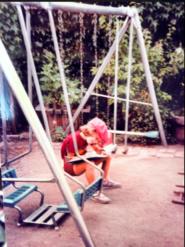
Confounded doctors are part of my earliest memories. As a child I had a large tumor in my leg that slowly ate two of the three muscles in my calf and caused increasing amounts of pain with each step I took. Eventually, I was put in a wheelchair, which devastated my parents. But at eight years old, I only knew the wheelchair ended the pain. It had its advantages. My best friend and I rented it out during recess for fifty cents a ride, which earned us a lot of money for candy, and gave the rest of my class a chance to do wheelies in the yard until we were caught by a teacher. The teacher put a stop to our rental business, but I didn’t get in trouble. Again, the wheelchair had its advantages.
Through one of life’s great flukes, a young couple moved in next door to my family during this time and one of them was in medical school. The med student befriended my parents after seeing my wheelchair and asked about my condition. My father told him about the endless stream of doctors who’d told us that the wheelchair was the only option, that surgery was not possible, and that the situation would only get worse. We’d been told that by the head doctor of our local hospital chain, with great certainty. Our neighbor was doing a rotation at Shriners Hospital in San Francisco, where he thought they might be able to help. He said not to worry about the cost, because for anyone under a certain income, Shriners was free. He knew my family would qualify.
He was right. Soon enough we took regular long trips “into the city” from where we lived to see a team of orthopedic and vascular surgeons. While the doctors at Shriners may not have immediately known how to treat me, they were quick to research potential solutions. I was checked into the hospital where, over the course of four or five days, there were countless tests and evaluations before they scheduled surgery.
While this was happening, I went to school—in the hospital. All of the kids did. Every morning we walked on crutches, rolled our wheelchairs, or in one case maneuvered a table on wheels down the hall from our rooms to the classroom.
Every kid’s regular teacher provided the hospital with schoolwork for us to do. I did the math and science worksheets as quickly as I could and then spent the most time on reading and writing, the subjects where I felt most at home. My teacher sent a stack of books for me to read and write about. While some people become immersed in stories to shield them from reality, I saw little difference between stories and my reality. I used story as proof that anything could happen. If I could imagine what I was reading, what could I imagine into reality?
The doctors at Shriners were not impressed one way or another by the fact that every other doctor had pronounced me incurable. When they were told that other doctors said surgery shouldn’t be done because it would make the remaining muscle unusable they said, “well, she’s not using it now anyway. So why wouldn’t we try?”After years of doctors telling us there was nothing they could do to help me walk, the Shriners doctors removed the tumor in my leg without incident. I was put into physical therapy and walking within a few days. I was released from the hospital after a total of two weeks, and sent back to school. I limped, and not fast. I was not strong. But I walked without pain.
* * *
The schools where we lived were troubled, and my parents had been looking for alternatives. I was OK with that, because I’d been the sick kid at my school, and I didn’t want to be that kid anymore. Eventually, my parents enrolled me in a Catholic school on the border of our city, a diverse place that accepted a range of kids, who may or may not have been Catholic, many of whom could not afford to be there. The school was rigorous and well rounded. We were asked to read at least one book on our reading level per month. In addition to class reading, we had a strenuous Math and Science program. We celebrated all kinds of holidays, including those from other religious traditions. On All Saints Day (the day after Halloween), the brass section of the school orchestra played “When the Saints Go Marching In” five times a day while we switched classrooms.
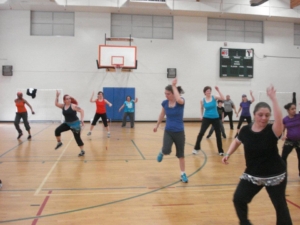
The P.E. teacher was also the Athletic Director for the Diocese, a charismatic guy named Joe Hayward who’d been confined to a wheelchair after complications from a virus after a bout of adult chickenpox. He was also our basketball coach.
Mr. Hayward drove a large seventies-era station wagon to school every day and, because religious schools weren’t required to be ADA compliant, there was no ramp or elevator. Every day Mr. Hayward would pull himself out of his wheelchair, sit on one step, then put his hands on the step behind him and lift himself up the stairs one at a time. He was practiced. The process went quickly. A student would be assigned to carry his wheelchair up the stairs and have it ready for him to lift himself into. If I could go back in time, I would build him a ramp. But that’s another story.
Sometimes I hung out on the stairs and talked to him while he carried himself up. He asked me about my reading, and brought up ideas I never would have thought about. I remember one day discussing our school’s namesake, St. Augustine, whom Mr. Hayward said was likely a black man. Mr. Hayward talked to me about playing sports; he said he needed me, I should be there, and it’s important to be a part of the team.
* * *
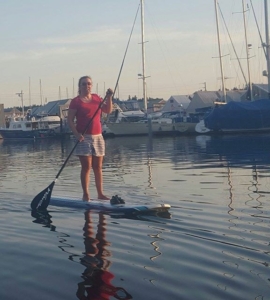
It’s only in adulthood that I realize how revolutionary my education at St. Augustine’s was. Other schools in our neighborhoods didn’t have nearly as much to offer. We didn’t think twice about the fact that we read Shakespeare in the eighth grade or that our P.E. teacher was in a wheelchair. We weren’t surprised when they brought in a graduate student to teach us Latin. We elected one person from each class as “class peacemaker” each month. At one Christmas pageant, Mary was played by the daughter of a lesbian couple, Joseph was a multiracial boy, and the baby Jesus was the six-month-old child of our school secretary, a recent immigrant from Haiti. Many of us lived in poor neighborhoods, came from working class families. Many of our parents had never been to college and worked at low wage jobs. And I, much to the delight of my doctors at Shriners, played on the basketball team, a scrappy group with a tendency to foul out. It had only been a year or so since my surgery and I sprained my ankle a lot, which left me on the bench for several games, until one night, so many of our players fouled out that we didn’t have enough on the floor. Mr. Hayward had a brilliant plan; he put me in and told me to stay on our side of the court, so when the other team came dribbling back from their side to score a basket, I could surprise them and be right in their faces with defense.
“Believe me,” he said. “They’ll never know what hit them!”
* * *
I’ve always been taught by both teachers and experience that there are options. A few weeks ago, I told a pulmonary specialist that there must be other options and he told me I was difficult. I’d been trying to tell him that I’d already done all the basic things you are supposed to do when you have breathing problems: I covered my mattress and pillows; I deep cleaned my house; I even got a robot vacuum cleaner that eats up the dust every day. All of that stuff helped some, but the only time I’d been able to fully breathe, without tightness or wheezing, was during a course of prednisone steroids. He didn’t believe me. He said I just had a cold, and I’d get over it.
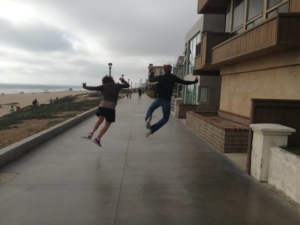
The truth is, I didn’t care what he believed. I knew it was not a cold. Starting from a young age I’d followed characters both real and imagined who stayed true to themselves and lived their own lives. Mr. Hayward became an Athletic Director after he was paralyzed. None of us ever questioned this. While in Shriners, I read all the Judy Blume novels, but I was mostly entranced by Emily Pollifax, a fictional grandmother who became an unexpected spy excelling in martial arts. I saw no reason why a grandmother couldn’t become a martial arts expert or have the skills to be a spy. She made sense to me. There were people in every area of my life defying unnecessary constraints. I never saw any evidence that my teachers hesitated to cast the daughter of a lesbian couple as Mary in the Christmas Pageant. I never knew at the time that other Catholic schools would shudder at this thought.
Last week a geneticist diagnosed me with a rare condition called Cowden’s Syndrome. Cowden’s explains every health problem I’ve had in my life going back to the tumor that put me in that wheelchair. This diagnosis allows for all of the preventative tests I could possibly need, and helps all the specialists see that every problem I have ties together. They matched me with a pulmonary specialist they respect, and I don’t think he’s going to tell me that I’m difficult.
Every day I think about the fact that I can walk, swim—and sometimes dance—because we challenged what doctors decided was true and pressed on. I look forward to being able to jump and dance like I used to, before my asthma came back with such vengeance. It isn’t easy to challenge a system that doesn’t want to hear what you have to say. But it’s easier when you have the hope that challenging authority will save your life, or keep it livable. That’s where I am. And like the wheelchair, my situation has its benefits. I am an outlier. I’ve had a lot of practice at speaking up and listening to my instincts. I argue for what I know to be true. The Shriners are outliers too, and there are countless more like us. Some of us live big lives in the midst of national challenges, and some of us live small lives with small choices, but we are a large tribe.
These are uncertain times, but together we challenge that which needs it. You don’t have faith in possibility? We do. Come stand by us.

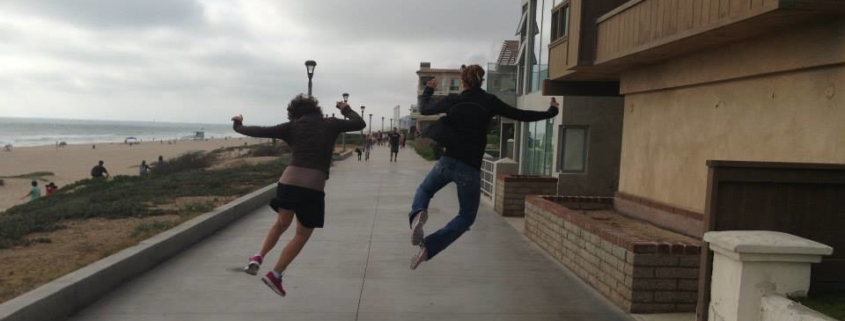
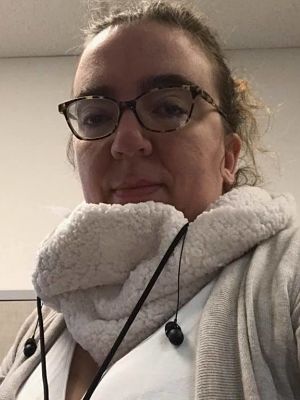 Emma Margraf is a writer who lives in Olympia, Washington, works for the state government, and writes for several local publications in the South Sound. She has been published in Manifest Station and is a candidate for an MFA at Antioch University Los Angeles.
Emma Margraf is a writer who lives in Olympia, Washington, works for the state government, and writes for several local publications in the South Sound. She has been published in Manifest Station and is a candidate for an MFA at Antioch University Los Angeles.


